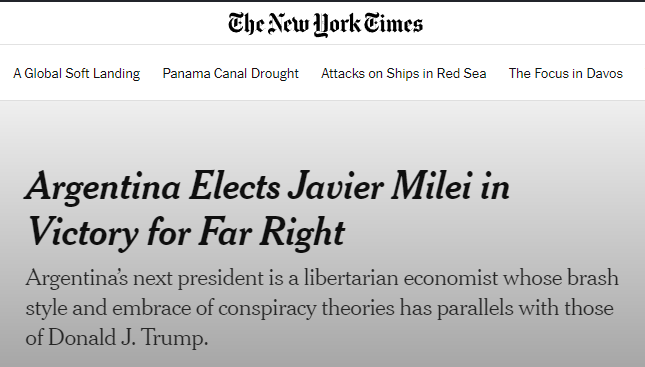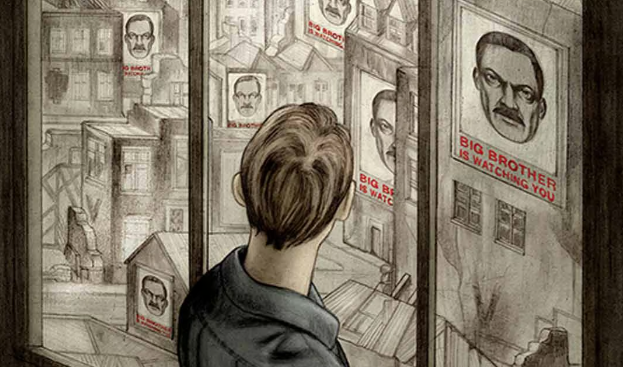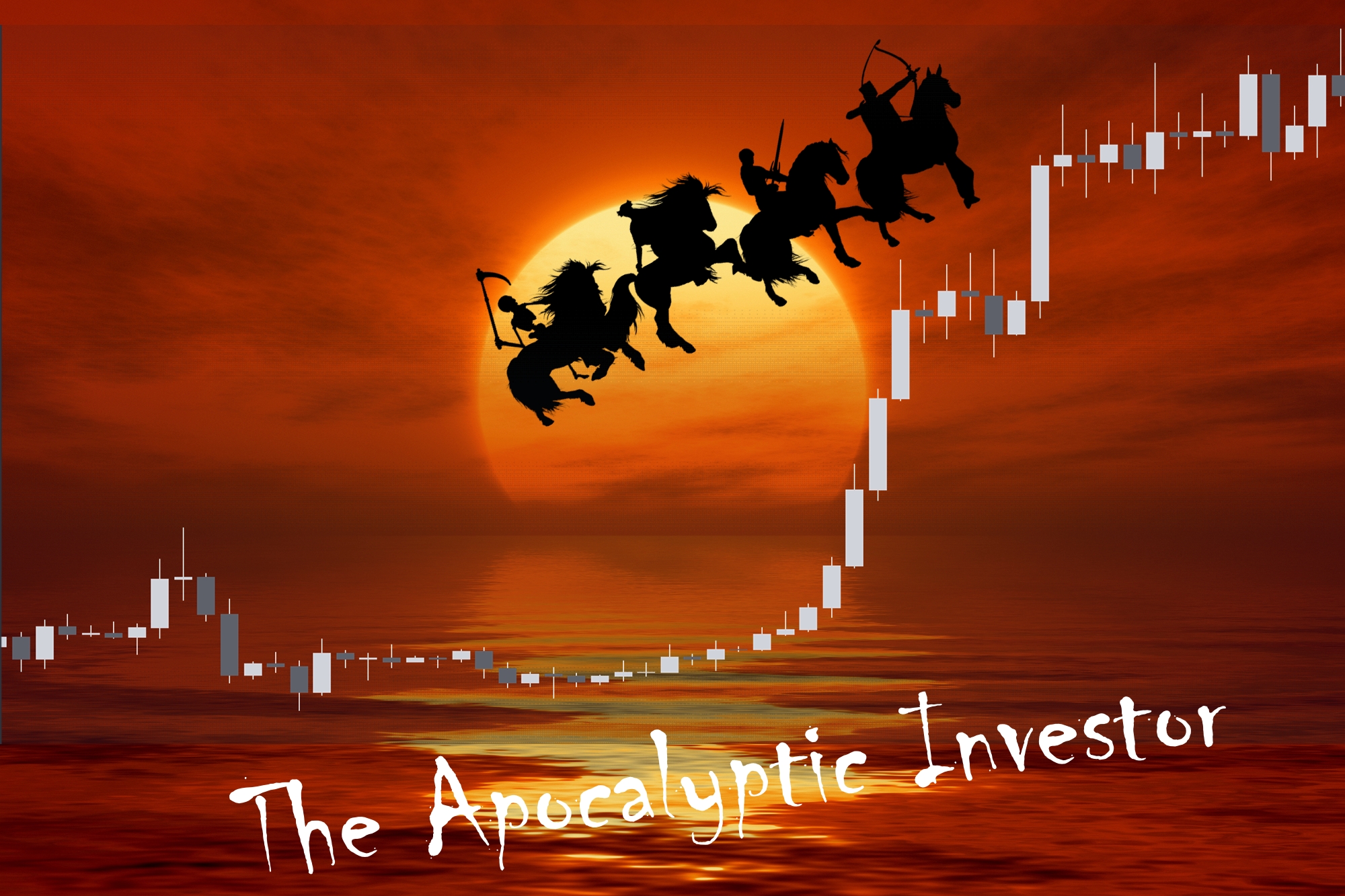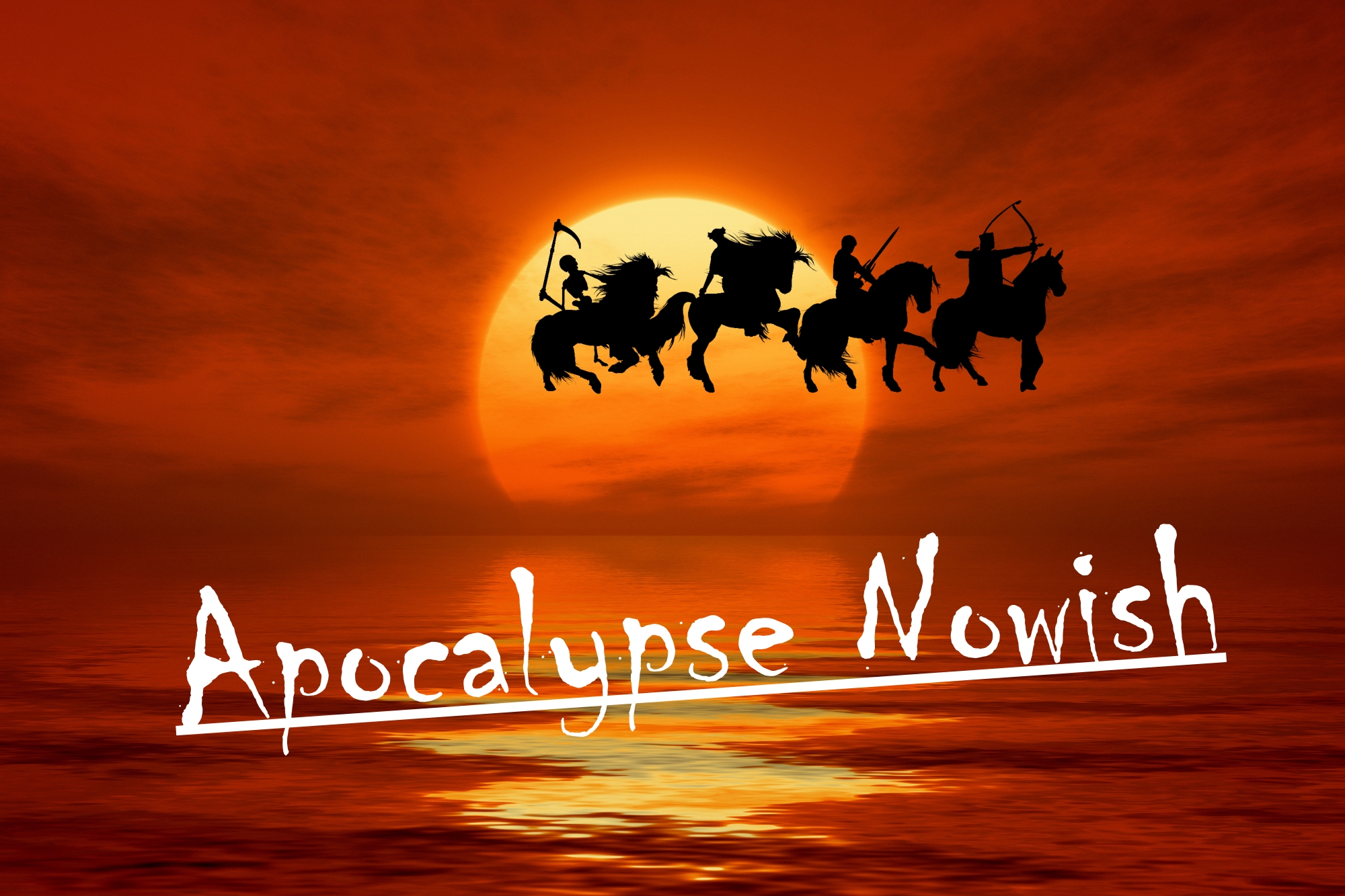Our beloved “elites” met at the World Economic Forum recently, from 15-19 Jan 2024, at the ultra-luxury Swiss resort of Davos. They flew there on hundreds of private jets to pontificate about CO2 emissions and think of more ways to stop the little people flying, driving cars, and eating real food.
All governments and their symbiotes in large corporations worldwide think alike these days: ever-more restrictions and State control is needed to protect us all from various State-sponsored or imaginary problems.
Except one.
Argentina is the only country in the world whose leader, Javier Milei, wants less power for his own government, and is acting on it by scrapping departments and cutting regulations wholesale.

He is a libertarian, which means he wants a very small State and as few rules as practical. Wanting to give as much freedom as possible to as many people as possible got him flagged by the corporatist owners of the mainstream media as being “far right”, and they all duly published nonsensical hit pieces on him when he was elected.

Amidst all the manufactured consensus and plastic backslapping, the former economics professor actually rocked up on stage at Davos to tell the audience – a collection of the worst people you could gather in one room outside of a maximum security prison – that they were the problem in the world today. I don’t know how he is still alive, given the CIA’s phenomenal record in engineering accidents for leaders who refuse to comply.
Why it’s great
Doug Casey called Milei’s speech (of which I’ve included a transcript below) “by far the most important speech anyone has given so far this century.”
Quite apart from the dramatic lions’-den setting, the content itself is – for a politician – unique in theme and scope. It ties together finances and ethics, which are artificially separated in our normal discourse, puts the eternal battle between Good and Evil in historical, measurable context, and issues a stirring challenge to the listener.
I disagree with President Milei that the exponential growth in GDP in the last two centuries is only due to capitalism; I think it is identical with the exponential growth in the use of oil (as Chris Martenson explains, oil=GDP). But a serious comparison of free societies and unfree ones always shows the vastly superior poverty-reducing power of freedom: while the free rich may get richer faster, the free poor are also raised much higher, regardless of their access to oil. So the main point stands.
To hear that Nazism and Communism are, in the most important aspect, the same, is surprising when, on the political axis that we’re given, one is Far Right and one Far Left, which would seem to make them opposites.

Milei continues, redefining what socialism means in the modern age, which is likewise an unexpected but necessary move. And finally, after all the groundwork has been laid and proof offered, there is the simple assertion that the State is the problem. The minds of the globalist audience must have recoiled. And perhaps some ordinary folk, too, watching from around the world, blinked and failed to process this. Why?
Unthinkable
Most people think the way that most people think – which is to say, they echo what they’ve heard or read without examining it from first principles. Similar new ideas trigger a comfortable feeling. Different ideas trigger discomfort and rejection. Even the most diligent of us still function somewhat like this.

Why are there so many landmines in Milei’s speech? Why does it trigger cognitive dissonance? Why will many good people be unable to hear what he’s saying, unable to think what he’s thinking?
Here’s what occurred to me. Consider the incredible power of war. If the State wants, it can level cities, destroy societies, kill millions (even the poorest of States have power enough to invite ruin on their own). It can Shock and Awe. Or it can quietly change the course of history, destabilising nations from the shadows. Or, if the State wants, it can go to space. Or perform any number of other miracles, in the open or in secret. If it wants.
Now, what does the State want, more than anything else?
To survive.
In order to continue to gather the support and money of the ordinary people, government must be seen as useful, necessary – indispensable. The absolute number-one priority of government – every government, of whatever party – is your belief that government is necessary. Just pause and think about that. What would the State be willing to do in order to grow and maintain that belief? How much effort would it put in, administration after administration, school after school, generation after generation? Are you sure you would notice the process, if it were a requirement of its success that you did not?
It’s not necessary for there to be a conspiracy. If you prefer, just think that they, naturally enough, assume government is Good, and they think and speak and act and mould your world with that assumption embedded.
How strong is your belief that a large, powerful government is necessary for a society to flourish? Did you even notice you had that solid belief? Are you conscious of where it came from? What would you have to see in the world for it to be wrong?
See for yourself
This speech gets more and more interesting and quotable as it goes on. I recommend taking the time to read it to the end. Incidentally, I corrected the transcript myself by listening to the simultaneous interpretation of the event video, and discovered that the WEF conveniently left a few of the more juicy phrases out. They just can’t help censoring, even their own guests.
The WEF transcript is here. Video with English audio is here.
Good afternoon. Thank you very much.
Today I’m here to tell you that the Western world is in danger. And it is in danger because those who are supposed to have to defend the values of the West are co-opted by a vision of the world that inexorably leads to socialism and thereby to poverty.
Unfortunately, in recent decades, the main leaders of the Western world have abandoned the model of freedom for different versions of what we call collectivism. Some have been motivated by well-meaning individuals who are willing to help others, and others have been motivated by the wish to belong to a privileged caste.
We’re here to tell you that collectivist experiments are never the solution to the problems that afflict the citizens of the world. Rather, they are the root cause. Do believe me: no one is in a better place than us, Argentines, to testify to these two points.
Thirty-five years after we adopted the model of freedom, back in 1860, we became a leading world power. And when we embraced collectivism over the course of the last 100 years, we saw how our citizens started to become systematically impoverished, and we dropped to spot number 140 globally.
But before having the discussion, it would first be important for us to take a look at the data that demonstrate why free enterprise capitalism is not just the only possible system to end world poverty, but also that it’s the only morally desirable system to achieve this.
If we look at the history of economic progress, we can see how between the year zero and the year 1800 approximately, world per capita GDP practically remained constant throughout the whole reference period.
If you look at a graph of the evolution of economic growth throughout the history of humanity, you would see a hockey stick graph, an exponential function that remained constant for 90% of the time and which was exponentially triggered starting in the 19th century.
The only exception to this history of stagnation was in the late 15th century, with the discovery of the American continent. But for this exception, throughout the whole period between the year zero and the year 1800, global per capita GDP stagnated.
Now, it’s not just that capitalism brought about an explosion in wealth from the moment it was adopted as an economic system, but also, if you look at the data, what you will see is that growth continues to accelerate throughout the whole period.
And throughout the whole period between the year zero and the year 1800, the per capita GDP growth rate remains stable at around 0.02% annually. So almost no growth. Starting in the 19th century with the Industrial Revolution, the compound annual growth rate was 0.66%. And at that rate, in order to double per capita GDP, you would need some 107 years.
Now, if you look at the period between the year 1900 and the year 1950, the growth rate accelerated to 1.66% a year. So you no longer need 107 years to double per capita GDP – but 66. And if you take the period between 1950 and the year 2000, you will see that the growth rate was 2.1%, which would mean that in only 33 years we could double the world’s per capita GDP.
This trend, far from stopping, remains well alive today. If we take the period between the years 2000 and 2023, the growth rate again accelerated to 3% a year, which means that we could double world per capita GDP in just 23 years.
That said, when you look at per capita GDP since the year 1800 until today, what you will see is that after the Industrial Revolution, global per capita GDP multiplied by over 15 times, which meant a boom in growth that lifted 90% of the global population out of poverty.
We should remember that by the year 1800, about 95% of the world’s population lived in extreme poverty. And that figure dropped to 5% by the year 2020, prior to the pandemic. The conclusion is obvious.
Far from being the cause of our problems, free trade capitalism as an economic system is the only instrument we have to end hunger, poverty and extreme poverty across our planet. The empirical evidence is unquestionable.
Therefore since there is no doubt that free enterprise capitalism is superior in productive terms, the left-wing doxa has attacked capitalism, alleging matters of morality, saying – that’s what the detractors claim – that it’s unjust. They say that capitalism is evil because it’s individualistic and that collectivism is good because it’s altruistic. Of course, with the money of others.
So they therefore advocate for social justice. But this concept, which in the developed world became fashionable in recent times, in my country has been a constant in political discourse for over 80 years. The problem is that social justice is not just, and it doesn’t contribute to general well-being.
Quite on the contrary, it’s an intrinsically unfair idea because it’s violent. It’s unjust because the state is financed through tax and taxes are collected coercively. Or can any one of us say that we voluntarily pay taxes? This means that the state is financed through coercion and that the higher the tax burden, the higher the coercion and the lower the freedom.
Those who promote social justice start with the idea that the whole economy is a pie that can be shared differently. But that pie is not a given. It’s wealth that is generated in what Israel Kirzner, for instance, calls a market discovery process.
If the goods or services offered by a business are not wanted, the business will fail unless it adapts to what the market is demanding. They will do well and produce more if they make a good quality product at an attractive price. So the market is a discovery process in which the capitalists will find the right path as they move forward.
But if the state punishes capitalists when they’re successful and gets in the way of the discovery process, they will destroy their incentives, and the consequence is that they will produce less.
The pie will be smaller, and this will harm society as a whole. Collectivism, by inhibiting these discovery processes and hindering the appropriation of discoveries, ends up binding the hands of entrepreneurs and prevents them from offering better goods and services at a better price.
So how come academia, international organisations, economic theorists and politicians demonise an economic system that has not only lifted 90% of the world’s population out of extreme poverty but has continued to do this faster and faster? And this is morally superior and just.*
Thanks to free trade capitalism, the world is now living its best moment. Never in all of mankind or humanity’s history has there been a time of more prosperity than today. This is true for all. The world of today has more freedom, is rich, more peaceful and prosperous. This is particularly true for countries that have more economic freedom and respect the property rights of individuals.
Countries that have more freedom are 12 times richer than those that are repressed. The lowest percentile in free countries is better off than 90% of the population of repressed countries. Poverty is 25 times lower and extreme poverty is 50 times lower. And citizens in free countries live 25% longer than citizens in repressed countries.
Now what is it that we mean when we talk about libertarianism? And let me quote the words of the greatest authority on freedom in Argentina, Professor Alberto Benegas Lynch Jr, who says that libertarianism is the unrestricted respect for the life project of others based on the principle of non-aggression, in defence of the right to life, liberty and property.
Its fundamental institutions being private property, markets free from state intervention, free competition, the division of labour, and social cooperation, as part of which success is achieved only by serving others with goods of better quality or at a better price.
In other words, capitalists – successful business people – are social benefactors who, far from appropriating the wealth of others, contribute to the general well-being. Ultimately, a successful entrepreneur is a hero.
And this is the model that we are advocating for the Argentina of the future. A model based on the fundamental principles of libertarianism. The defence of life, of freedom and of property.
Now, if free enterprise, capitalism and economic freedom have proven to be extraordinary instruments to end poverty in the world, and we are now at the best time in the history of humanity, it is worth asking why I say that the West is in danger.
And I say this precisely because in those of our countries that should defend the values of the free market – private property and the other institutions of libertarianism – sectors of the political and economic establishment, some due to mistakes in their theoretical framework and others due to a greed for power* are undermining the foundations of libertarianism, opening up the doors to socialism and potentially condemning us to poverty, misery and stagnation.
It should never be forgotten that socialism is always and everywhere an impoverishing phenomenon that has failed in all countries where it’s been tried out. It’s been a failure economically, socially, culturally and it also murdered over 100 million human beings.
The essential problem of the West today is not just that we need to come to grips with those who, even after the fall of the Berlin Wall and the overwhelming empirical evidence, continue to advocate for impoverishing socialism.
But there’s also our own leaders, thinkers and academics who, relying on a misguided theoretical framework, undermine the fundamentals of the system that has given us the greatest expansion of wealth and prosperity in our history.
The theoretical framework to which I refer is that of Neoclassical economic theory, which designs a set of instruments that, unwillingly or without meaning to, ends up serving intervention by the state, socialism and social degradation.
The problem with Neoclassicals is that the model they fell in love with does not map reality, so they put down their mistakes to supposed market failures rather than reviewing the premises of the model.
Under the pretext of a supposed market failure, regulations are introduced. These regulations create distortions in the price system, prevent economic calculus, and therefore also prevent saving, investment and growth.
This problem lies mainly in the fact that not even supposedly libertarian economists understand what the market is because if they did understand, it would quickly be seen that it’s impossible for there to be something along the lines of market failures.
The market is not a mere graph describing a curve of supply and demand. The market is a mechanism for social cooperation, where you voluntarily exchange ownership rights. Therefore, based on this definition, talking about a market failure is an oxymoron. There are no market failures.
If transactions are voluntary, the only context in which there can be a market failure is if there is coercion – and the only one that is able to coerce generally is the state, which holds a monopoly on violence.
Consequently, if someone considers that there is a market failure, I would suggest that they check to see if there is state intervention involved. And if they find that that’s not the case, I would suggest that they check again, because obviously there’s a mistake. Market failures do not exist.
An example of the so-called market failures described by the Neoclassicals are the concentrated structures of the economy. However, without increasing returns to scale functions, whose counterpart are the concentrated structures of the economy, we couldn’t possibly explain economic growth since the year 1800 until today. Isn’t this interesting.* From the year 1800 onwards, with the population multiplying by 8 or 9 times, per capita GDP grew by over 15 times, so there were growing returns which took extreme poverty from 95% to 5%.
However, the presence of growing returns involves concentrated structures, what we would call a monopoly. How come, then, something that has generated so much well-being is, for the Neoclassical theory, a market failure?
Neoclassical economists think outside of the box. When the model fails, you shouldn’t get angry with reality but rather with a model and change it. The dilemma faced by the Neoclassical model is that they say they wish to perfect the function of the market by attacking what they consider to be failures. But in so doing, they don’t just open up the doors to socialism but also go against economic growth.
For example, regulating monopolies, destroying their profits and destroying growing returns would automatically destroy economic growth. In other words, whenever you want to correct a supposed market failure, inexorably, as a result of not knowing what the market is, or as a result of falling in love with a failed model, you are opening up the doors to socialism and condemning people to poverty.*
However, faced with the theoretical demonstration that state intervention is harmful, and the empirical evidence that it has failed (couldn’t have been otherwise), the solution proposed by collectivists is not greater freedom but rather greater regulation, which creates a downward spiral of regulations until we are all poorer and our lives depend on a bureaucrat sitting in a luxury office.
Given the dismal failure of collectivist models and the undeniable advances in the free world, socialists were forced to change their agenda: they left behind the class struggle based on the economic system and replaced this with other supposed social conflicts, which are just as harmful to life as a community and to economic growth.
The first of these new battles was the ridiculous and unnatural fight between man and woman. Libertarianism already provides for equality of the sexes. The cornerstone of our creed is that all humans are created equal and that we all have the same inalienable rights granted by the Creator, including life, freedom and ownership.
All that this radical feminism agenda has led to is greater state intervention to hinder economic process, giving jobs to bureaucrats who have not contributed anything to society. Examples are ministries of women or international organisations devoted to promoting this agenda.
Another conflict presented by socialists is that of humans against nature, claiming that we human beings damage the planet which should be protected at all costs, even going as far as advocating for population control mechanisms or the bloody* abortion agenda.
Unfortunately, these harmful ideas have taken a stronghold in our society. Neo-Marxists have managed to co-opt the common sense of the Western world, and this they have achieved by appropriating the media, culture, universities and also international organisations.
The latter case is the most serious one, probably, because these are institutions that have enormous influence on the political and economic decisions of their member states.
Fortunately there’s more and more of us who are daring to make our voices heard, because we see that if we don’t truly and decisively fight against these ideas, the only possible fate is for us to have increasing levels of state regulation, socialism, poverty and less freedom, and therefore, worse standards of living.
The West has unfortunately already started to go along this path. I know, to many it may sound ridiculous to suggest that the West has turned to socialism, but it’s only ridiculous if you only limit yourself to the traditional economic definition of socialism, which says that it’s an economic system where the state owns the means of production. This definition, in my view, should be updated in the light of current circumstances.
Today, states don’t need to directly control the means of production to control every aspect of the lives of individuals. With tools such as printing money, debt, subsidies, controlling the interest rate, price controls, and regulations to correct so-called market failures, they can control the lives and fates of millions of individuals.
This is how we come to the point where, by using different names or guises, a good deal of the generally accepted political offers in most Western countries are collectivist variants, whether they proclaim to be openly communist, fascist, Nazis*, socialists, social democrats, national socialists, Christian democrats, neo-Keynesians, progressives, populists, nationalists or globalists.
Ultimately, there are no major differences. They all say that the state should steer all aspects of the lives of individuals. They all defend a model contrary to the one that led humanity to the most spectacular progress in its history.
We have come here today to invite the rest of the countries in the Western world to get back on the path of prosperity. Economic freedom, limited government and unlimited respect for private property are essential elements for economic growth. The impoverishment produced by collectivism is not a fantasy, nor is it an inescapable fate. It’s a reality that we Argentines know very well.
We have lived through this. We have been through this because, as I said earlier, ever since we decided to abandon the model of freedom that had made us rich, we have been caught up in a downward spiral – a spiral by which we are poorer and poorer, day by day.
This is something we have lived through and we are here to warn you about what can happen if the countries in the Western world that became rich through the model of freedom, stay on this path of servitude.
The case of Argentina is an empirical demonstration that no matter how rich you may be, how much you may have in terms of natural resources, how skilled your population may be, how educated, or how many bars of gold you may have in the central bank – if measures are adopted that hinder the free functioning of markets, free competition, free price systems, if you hinder trade, if you attack private property, the only possible fate is poverty.
Therefore, in concluding, I would like to leave a message for all business people here and those who are not here in person but are following from around the world.
Do not be intimidated by the political caste or by parasites who live off the state. Do not surrender to a political class that only wants to stay in power and retain its privileges. You are social benefactors. You’re heroes. You are the creators of the most extraordinary period of prosperity we’ve ever seen.
Let no one tell you that your ambition is immoral. If you make money, it’s because you offer a better product at a better price, thereby contributing to general wellbeing.
Do not surrender to the advance of the state. The state is not the solution. The state is the problem itself. You are the true protagonists of this story and rest assured that as from today, Argentina is your staunch and unconditional ally.
Thank you very much and long live freedom, damnit!
Special address by Javier Milei, President of Argentina, during the World Economic Forum’s Annual Meeting in Davos, Jan 2024. Source. * Italicised sections can be heard in the real-time interpretation but were omitted from the official transcript(!)
🌍 Share this:
Want more to read? Here are my latest articles:











